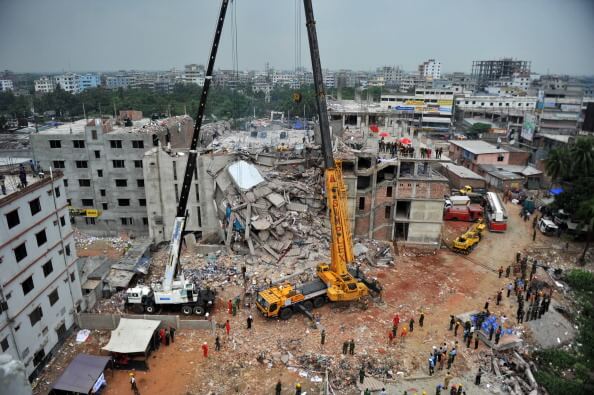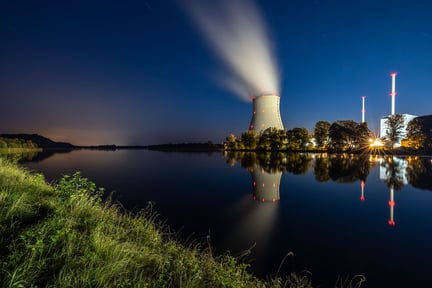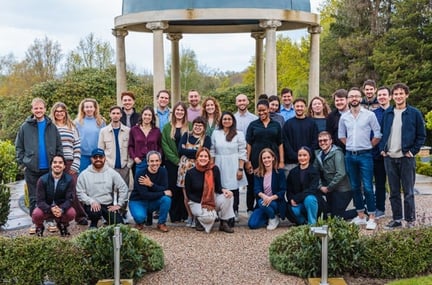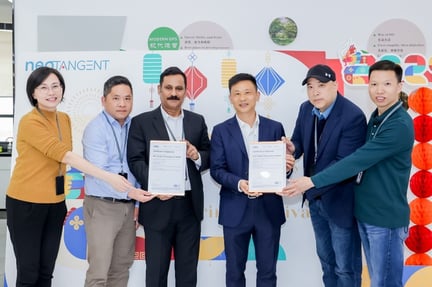The collapse of the Rana Plaza building in 2013 was an inflexion point in the evolution of supply chain due diligence.
In one of the worst industrial incidents to affect the garment sector, a perfect storm of poor building materials, intense demand on a weak power grid, unsuitable land, corruption, and architectural inexperience saw the building collapse, killing over 1,100 people and injuring 2,500 more.

According to sustainability experts from LRQA and its ESG assurance acquisition, ELEVATE, the Rana Plaza incident did not take place in isolation. Instead, it acted as a final catalyst to bring formidable change. Ian Spaulding, LRQA Assessments Business Director, founder and former CEO of ELEVATE, says:
“There were several incidents similar to Rana Plaza that we were all trying to identify and remediate, but we lacked some of the tools, the financial resources and, most importantly, the will from the government, from the industry and from international buyers to bring about change.
What happened on 24th April changed that and woke the international community to the challenges that we had known for quite some time. The sheer size of this particular tragedy and the number of people impacted led to the formation of a number of formal efforts to set standards, to inspect factories, and to remediate buildings. ELEVATE was one of dozens of organisations that stepped in to lend our support."
The sheer size of this tragedy and the number of people impacted led to a number of formal efforts to set standards, inspect factories and remediate buildings.
A symbol of reform
A number of global brands and retailers, including those from Europe and the US, were identified as having recent or current orders with at least one of the five garment factories housed within Rana Plaza. Beyond the short-term emergency response, rescue operation and declaration of national mourning by the Bangladesh government, the collapse shone a light on the longer-term issues of working conditions across the sector, establishing Rana Plaza as a symbol for the urgent need to reform.
Rana Plaza completely changed the social compliance model, according to Savitri Restrepo, Associate Director for Sustainability Consulting and Human Rights. “One of the many legacies to emerge from the incident was the need to shift the model from compliance to proactive accountability. Previous compliance models really focused on single periodic audits that offered partial snapshots of safety and working conditions. Also, different standards on structural, fire and electrical safety were being used by individual brands and even then, were poorly enforced locally."
“This demonstrated the need for apparel companies to increase audit standards, and the social compliance industry to do more effective due diligence. This really was a true call for industry action to establish a set of internationally recognised principles for shared accountability, where suppliers and brands are both responsible.”
One of the many legacies to emerge from the incident was the need to shift the model from compliance to proactive accountability.
Worker voice as an effective risk management tool
There are several critical tools used by the private sector and international community to manage risk effectively. One example, born from the Rana Plaza incident, is the Amader Hotha Helpline currently operated by the Elevate team in partnership with Phulki – a local Non-Governmental Organisation based in Bangladesh – and The Cahn Group – a consulting firm based in Boston, which provides a trusted channel to report problems with their working environment in conjunction with trade union activity.
Savitri adds: “Through this helpline, we receive an average of 3,000 calls per month from workers across 1,500 factories. For perspective, that represents about one-third of the entire garment sector in the country. International businesses that are part of this programme are informed proactively of any high-risk issues that are reported by workers so they can take immediate action to address these concerns.”
International businesses in this programme are proactively informed of any high-risk issues reported by workers, so they can take immediate action to address these concerns.
A collective response
Mamun Zaman – ELEVATE’s Associate Director for Operations in Bangladesh, describes how the incident response was one underpinned by collaboration, where numerous companies and institutions assembled and mobilised quickly following the incident.
“One of the most significant long-term responses, in addition to the Amader Kotha Helpline, was the formation of the Accord on Fire and Building Safety in Bangladesh between global brands, retailers and trade unions - an independent agreement and framework to upgrade the engineering skills and fire safety capabilities within Bangladesh."
One of the most significant long-term responses, in addition to the Amader Kotha Helpline, was the formation of the Accord on Fire and Building Safety in Bangladesh.
ELEVATE supported these efforts on the ground at Bangladesh, a point of pride for the team in the tragic circumstances. Ian explains: “We brought on board dozens of auditing companies that specialise in fire, electrical, and structural inspection, who audited over 600 factories, remediated more than 40,000 violations (an average of 75 violations per factory), and ultimately improved the safety of around 1.2 million workers."
“We got workers out of the building, and we got them paid for any lost income. We mobilised people and banks to get involved, we launched a $50m USD credit facility in partnership with the International Finance Corporation and the US Agency for International Development in order to get low-cost loans available to factories that were struggling to get some access to capital for remediation."
“We worked with the National Fire Protection Association and the University of Maryland to train, upgrade and improve local engineering capabilities. We brought in external assistance to support the local engineering community within Bangladesh, so that people could learn about fire protection, the right way to build buildings, the right way to install electrical installations.”
Ian claims the real measure of the success of the collective efforts will be: have we sustained the remediation, have we sustained the improvement over time? “We’re commemorating this ten-year anniversary and the good work that’s happened, but we still recognise there are still prevalent issues and the collective work is not yet done."
Proactive vs reactive
Despite the devastation, Bangladesh responded by upgrading and improving thousands of factories for millions of workers, but it was in reaction. In terms of moving to a proactive risk management model, there were a range of solutions available, one of which being the integration of worker voice feedback through trusted grievance mechanisms and helplines according to Savitri. Savitri explains:
“Also strengthening the opportunity for brands to collaborate on issues that require remediation will be crucial. One of the criticisms of the compliance movement is that suppliers are often subject to diverse and even conflicting brand standards on a variety of issues, so we have to really focus on harmonising standards and enabling sectoral initiatives that can help avoid suppliers from muddling through different customer expectations and, alongside public disclosure, ultimately help us build trust amongst all stakeholders.”
A shared responsibility
The auditing profession, including companies like ELEVATE and LRQA, are being held to enhanced standards, Ian concludes. “We have to demonstrate that we have the right people that are competent, that can deliver a professional due diligence on behalf of our clients, and that we have oversight of our profession in order to ensure that we meet the standards if you will. I think that’s going to continue to be around for the future of ESG due diligence. We need to be held accountable just like the factories on the ground in Bangladesh need to be accountable."
“It’s a shared responsibility.”









